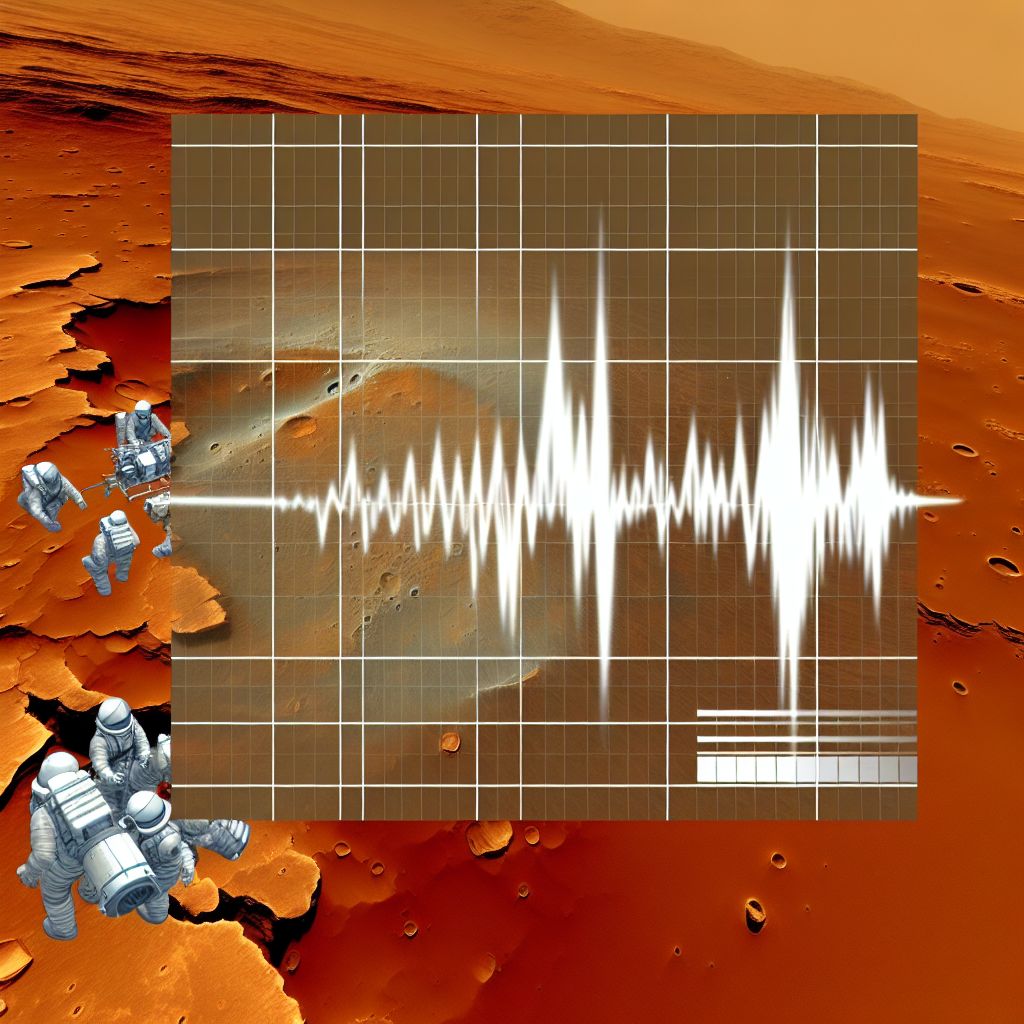Marsbeben / Terremoto en Marte / Terremoto em Marte / Marsquake / Terremoto su Marte
A marsquake in the Space industry context refers to a seismic event or earthquake-like Phenomenon occurring on the planet Mars. Unlike earthquakes, which are caused by tectonic activities on Earth, marsquakes can result from various factors, including volcanic activity, meteorite impacts, or the planet's crust cooling and contracting. The study of marsquakes is a crucial part of understanding the geologic and tectonic activity of Mars, providing insights into the planet's internal structure, Composition, and evolutionary history.
Description

The study of marsquakes is a relatively new field, enabled by the deployment of seismometers on Mars. NASA's InSight Lander, which landed on Mars in November 2018, is equipped with a highly sensitive seismometer designed to detect and analyze marsquakes. This instrument allows scientists to probe the interior of Mars in ways previously not possible, much like how geologists have studied Earth's interior through seismic waves generated by earthquakes.
Application Areas
- Planetary Geology: Understanding marsquakes helps scientists learn about the geologic processes that shape Mars, including volcanic activity and crustal movement.
- Planetary Internal Structure: Seismic data from marsquakes provide clues about the composition and structure of Mars' interior, including the size and state of its Core, mantle, and crust.
- Comparative Planetology: By comparing seismic activity on Mars with that on Earth and other Celestial bodies, scientists can gain insights into the differences and similarities in planetary formation and evolution.
Well-Known Examples
- InSight Mission: NASA's InSight (Interior Exploration using Seismic Investigations, Geodesy, and Heat Transport) lander has a primary mission to study marsquakes and has detected hundreds of seismic events, ranging from small tremors to significant quakes, since it began operations on Mars.
Treatment and Risks
Studying marsquakes involves specific challenges, including:
- Seismometer Sensitivity: Ensuring the seismometer is sensitive enough to detect marsquakes, despite the quiet seismic Environment of Mars compared to Earth.
- Data Interpretation: Accurately interpreting the seismic data to distinguish marsquakes from other sources of vibrations, such as wind or the lander's own movements.
- Remote Operation: Managing and maintaining sensitive scientific instruments on the surface of Mars, millions of kilometers away from Earth, requires robust systems and careful planning.
Similar Terms or Synonyms
- Martian earthquakes
- Seismic activity on Mars
- Planetary seismology
Summary
Marsquakes are a key Focus of planetary Science, offering a window into Mars' internal processes and structure. The ongoing study of these seismic events, primarily through missions like NASA's InSight lander, marks a significant step forward in our understanding of Mars and the broader field of comparative planetology, shedding Light on the dynamic processes that drive planetary evolution across the solar system.
--
Related Articles to the term 'Marsquake' | |
| 'Seismology' | ■■■■■■■■■■ |
| Seismology is the study of earthquakes and other seismic activity. In the aerospace context, Seismology . . . Read More | |
| 'Seismometer' | ■■■■■■■■ |
| Seismometer: A seismometer is an instrument that responds to ground noises and shaking such as caused . . . Read More | |
| 'InSight' | ■■■■■■■ |
| InSight (Interior Exploration using Seismic Investigations, Geodesy and Heat Transport) is a NASA Discovery . . . Read More | |
| 'Mineral' at environment-database.eu | ■■■■■■■ |
| A Mineral is any naturally occurring Inorganic substance found in the earth's crust as a crystalline . . . Read More | |
| 'Mineralogy' at environment-database.eu | ■■■■■■■ |
| Mineralogy in the environmental context involves the study of minerals, their composition, structure, . . . Read More | |
| 'Galaxy' | ■■■■■■ |
| Galaxy: A galaxy is a large system of stars, gas, and dust that is held together by gravity. Galaxies . . . Read More | |
| 'Geophysics' | ■■■■■■ |
| Geophysics is a subject of natural science concerned with the physical processes and physical properties . . . Read More | |
| 'In-situ' | ■■■■■■ |
| In the space industry context, in-situ refers to the observation, analysis, or utilization of materials . . . Read More | |
| 'Vesta' | ■■■■■■ |
| Vesta in the space industry context refers to one of the largest objects in the asteroid belt between . . . Read More | |
| 'Human geography' at environment-database.eu | ■■■■■■ |
| Human geography: In the context of the environment, human geography is the study of how human activities . . . Read More | |
